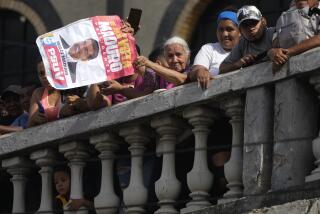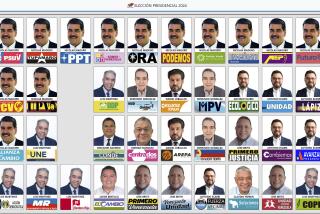A Former Hero Nearly Humiliated
- Share via
MUNCIE, IND. — Zimbabwe’s embattled President Robert Mugabe and his ruling Zimbabwe African National Union-Patriotic Front (ZANU-PF) may have won the parliamentary skirmishes last week but they seem likely to lose the war in the presidential election two years from now. Although his party won 62 seats, the upstart Movement for Democratic Change (MDC) collected 57, an outcome that promises trouble ahead for the ZANU-PF. Mugabe’s party lost heavily in urban areas, especially Harare and Bulawayo, the country’s two largest cities. Those setbacks came on the heels of closing election rallies at which Mugabe’s speeches attracted far fewer people than those of Morgan Tsvangirai, his chief rival.
This must be hard for Mugabe, a proud and brilliant man, to accept. After all, it was only 20 years ago that a triumphant Mugabe, returning from neighboring Mozambique, the exile headquarters from which he directed the successful guerrilla war to end white minority rule, was received as a conquering hero. In Harare, he addressed an ecstatic rally estimated at 100,000 to 250,000 people. Last month, only 5,000 people, some of whom were there involuntarily or because of bribes, came to hear him in the same arena.
So far, 2000 has not been a good year for Mugabe. In February, he suffered his first electoral defeat in 20 years when Zimbabwe voters rejected a constitution that would have increased his already considerable powers. Barely four months later, his once-powerful party eked out a narrow victory, with some of his closest aides losing. As president, Mugabe gets to appoint 20 non-constituency members to parliament, and the chiefs will choose another 10.
The final makeup of the new parliament could change, however, if an MDC challenge is successful. Tsvangirai has said his party will demand a recount--and may go to court--in 20 constituencies where the MDC lost by 500 or fewer votes.
Were it not for the support that Mugabe’s party garnered in the country’s dusty rural areas, the 37-year-old ZANU-PF would have been humiliated by the 9-month-old MDC. It is clear from these results, in which the ruling party had just 70,000 more votes nationwide than the MDC, that Zimbabwe urbanites are ready to retire Mugabe. Corruption, cronyism, economic mismanagement, unemployment of more than 50%, an inflation rate of 60%, chronic fuel shortages, spiraling costs for basic food items--including bread, milk, meat, cornmeal and sugar--have turned many urban dwellers against the government.
The election marks a watershed in Zimbabwe politics. There has been a generational shift. The “born frees”--young people who have no experience of being under white minority rule--have turned against Mugabe and his party. Tired of the liberation stories, they want to know what the Mugabe government will do about the economy, inflation, creating jobs, gasoline shortages, providing better health care and improving their generally bleak lives. Their fathers, especially those in the rural areas who are not dependent on a cash economy, may still support ZANU-PF because it freed them from colonial rule. Many of them also identify with ZANU-PF’s aging leadership. Mugabe has kept many of the same people in his Cabinet for 20 years, often recycling even the incompetent ones from one position to another.
In the run-up to the elections, the government encouraged veterans of the liberation war to invade white-owned farms. Under minority rule, whites owned much of the country’s most arable land; blacks were landless or confined to poor land. So land is a hot-button issue in the country. It resonates, especially with those in the rural areas. Soon after independence, the Mugabe government promised to resettle about 160,000 black families. That has yet to happen.
But during every election cycle since 1980, ZANU-PF has promised to redistribute land, without doing more than talk about it. It remains to be seen if Mugabe will carry through with his threats to redistribute forcibly seized land and what damage that may do to a fragile economy desperate for investment capital.
There are reports of grumbling within ZANU-PF because of the election results. There are some who worry that the current unpopularity of ZANU-PF and Mugabe could send the party to a crushing defeat in the 2002 presidential elections. Others fear that Mugabe’s departure, since there is no designated successor nor a process for choosing one, could lead to internecine struggles, which could destroy the party.
Regardless of what happens, it seems that Mugabe’s days in power are waning. His reputation has been tarnished. Regardless of what some of his people may say, he is no longer regarded as infallible or irreplaceable. It is no longer unthinkable to talk about a post-Mugabe Zimbabwe. The MDC is waiting in the wings. Tsvangirai has announced that he will run for president in 2002. If he were to win, he would be in a position to dismiss the ZANU-PF government, sack the 30 appointed members of parliament and replace them with his own people.
Meanwhile, the MDC is well positioned to ensure that the next parliament is not going to be a rubber stamp for Mugabe. It has enough votes to deny Mugabe the two-thirds majority he needs to amend the constitution. And it could team up with rebellious or dissident ZANU-PF legislators to pass legislation unpalatable to Mugabe in his remaining days in office.
As Mugabe himself admitted, the new parliament is likely to be lively and interesting. For the first time, there will be a legitimate opposition party, one that sees itself as a government-in-waiting. How Mugabe and ZANU-PF deal with this will be test of their commitment to democracy and to whether the elections, described as neither free nor fair by some international observers (at least 30 people, mostly opposition members, were killed during the campaign), will result in the restoration of confidence in Zimbabwe’s government and economy or lead to more polarization, intimidation and violence. The future does not look too promising for the man who once was Zimbabwe’s undisputed leader and whose party was once considered invincible.
More to Read
Sign up for Essential California
The most important California stories and recommendations in your inbox every morning.
You may occasionally receive promotional content from the Los Angeles Times.













